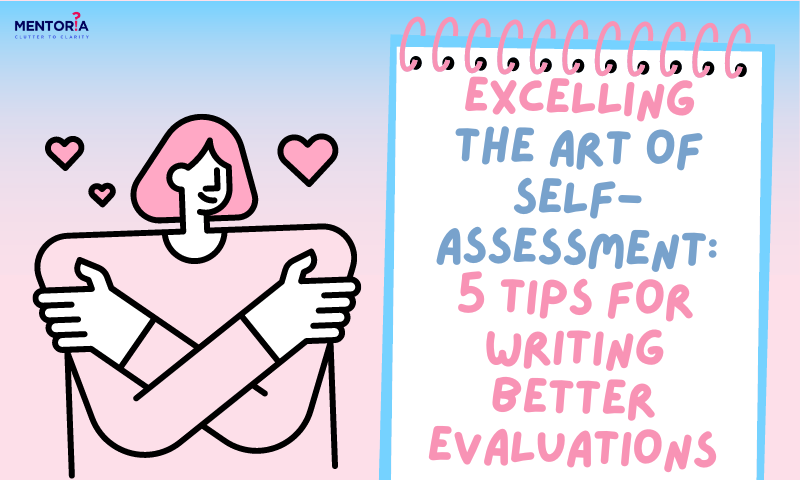Excelling The Art of Self-Assessment: 5 Tips For Writing Better Evaluations

Have you ever struggled with writing self-assessments or evaluations? Do you find the process tedious and unenjoyable? Fear not, because in this blog, we’re going to share with you five tips for excelling in the art of self-assessment and writing better evaluations!
Gone are the days of boring, monotonous evaluations. It’s time to make the process fun, engaging, and interactive. Whether you’re a student, a professional, or just someone who wants to improve their self-assessment skills, this blog is for you.
So, sit back, relax, and let’s dive into the world of self-assessment!
Be Very Specific With What You Want To Convey
One of the most important tips for writing better evaluations is to be specific. Don’t be afraid to dig deep and provide detailed examples of your achievements and challenges. Use specific metrics, numbers, and outcomes to showcase your successes. By being specific, you’ll demonstrate your value and impact, and help others understand the scope of your work. But being specific doesn’t have to be boring. Inject some fun and creative elements into your evaluation.
Use storytelling techniques to bring your experiences to life, include visuals and graphics to make your points pop, and use humour to lighten the tone. Remember, the more specific you are, the more powerful your evaluation will be. So, go ahead and get specific – your readers will thank you for it!
Use Active Language
Ready to elevate your self-assessment game? One surefire way to do so is by using active language. Get rid of those passive verbs and opt for action-packed phrases that highlight your achievements and strengths. Start your sentences with powerful verbs such as “improved,” “excelled,” and “led,” to emphasise your accomplishments. This not only adds energy and excitement to your writing, but also conveys your confidence and assertiveness.
Using active language will make your evaluations more engaging, interesting, and memorable. So, ditch the passive tone and inject some life into your self-assessment. By using active language, you’ll show your evaluator that you’re a go-getter who takes ownership of your successes, and is always striving for more.
Address Weaknesses Constructively
Evaluation time can be daunting, but it’s a great opportunity for self-reflection and growth! One tip for writing better evaluations is to address weaknesses head-on. Yup, you heard me right. It’s not always easy to admit where we fall short, but acknowledging our weaknesses is the first step in making meaningful progress.
But don’t worry, addressing weaknesses doesn’t have to be a negative experience. Instead, think of it as an opportunity to learn and improve. Take a growth mindset approach and focus on how you can turn your weaknesses into strengths. Talk about the specific actions you’ve taken to address these areas and the progress you’ve made.
Remember, evaluations are a chance to showcase your skills and potential, not just your accomplishments. By addressing weaknesses in a constructive and proactive way, you demonstrate your commitment to personal and professional growth. So let’s embrace our weaknesses and turn them into opportunities for growth and development!
Provide Some Context
Picture this: You’ve just completed a project that you’re particularly proud of, and you’re eager to share your accomplishments with your manager. However, as you start to write your evaluation, you realise that simply listing your achievements is not enough. To truly convey the impact of your work, you need to provide context. You need to explain the challenges you faced, the resources you had available, and the constraints you worked under. By doing so, you help your manager understand the scope and complexity of your work, and appreciate the effort and dedication you put into it.
Furthermore, by providing context, you demonstrate your ability to think critically, analyse problems, and make informed decisions. So don’t be afraid to provide context in your evaluations – it’s a powerful tool that can help you communicate your achievements and showcase your skills.
The Best Policy – Honesty!
When it comes to self-assessment, it can be tempting to exaggerate our accomplishments or downplay our weaknesses. However, being honest is essential for growth and development. Honesty allows us to identify areas where we need improvement and create a plan for growth. When writing a self-assessment, remember that honesty is key.
Be truthful about your strengths and weaknesses, and don’t be afraid to acknowledge areas where you need improvement. By being honest, you demonstrate self-awareness and a willingness to learn and grow. So, don’t be afraid to be honest with yourself and others. You will be surprised how much you can achieve when you are true to yourself. Let’s strive for progress, not perfection.
Self Assess With Mentoria!
In conclusion, mastering the art of self-assessment is not just a skill, it’s a mindset. By following these five tips for writing better evaluations, you can unlock your full potential and achieve your goals. Remember, self-assessment is not about being perfect, but rather about reflecting on your strengths and weaknesses and setting actionable goals for improvement. So, grab your pen and paper, and start your journey towards self-improvement today! Happy self-assessment!
Still feel like you could use a little help? Try attending our master workshops! Feel free to call us to speak to our mentors and choose the right guidance plan that suits your needs.
Mentoria’s guidance programme enables you to choose your perfect fit from 3 streams, 850+ courses, and discover what will bring out the best in you. Sign up today and take the Mentoria assessment to get started!








